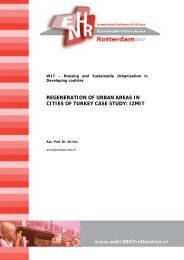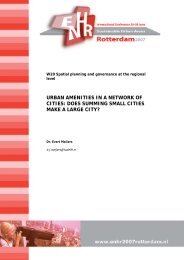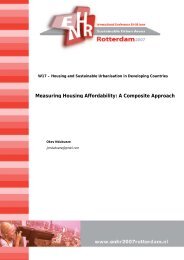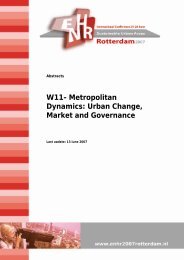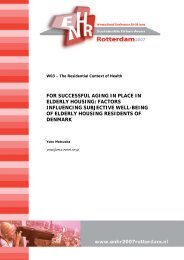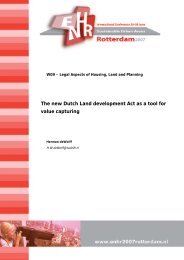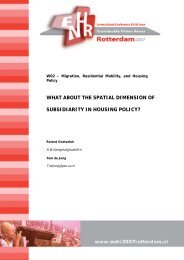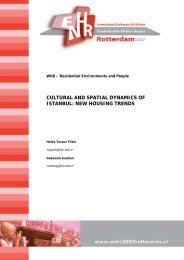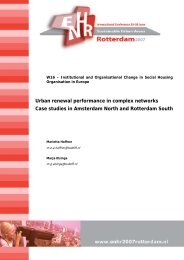Contractual Welfare Ideology and Housing Management Practice ...
Contractual Welfare Ideology and Housing Management Practice ...
Contractual Welfare Ideology and Housing Management Practice ...
You also want an ePaper? Increase the reach of your titles
YUMPU automatically turns print PDFs into web optimized ePapers that Google loves.
W07 – <strong>Housing</strong> Regeneration <strong>and</strong> Maintenance<br />
<strong>Contractual</strong> <strong>Welfare</strong> <strong>Ideology</strong> <strong>and</strong> <strong>Housing</strong> <strong>Management</strong><br />
<strong>Practice</strong>: The Deployment of ‘Tenant Incentive Schemes’<br />
in Australia.<br />
Keith Jacobs
ENHR Conference Rotterdam June 2008<br />
<strong>Contractual</strong> <strong>Welfare</strong> <strong>Ideology</strong> <strong>and</strong> <strong>Housing</strong> <strong>Management</strong><br />
<strong>Practice</strong>: The Deployment of ‘Tenant Incentive Schemes’ in<br />
Abstract<br />
Australia.<br />
Keith Jacobs<br />
University of Tasmania, Australia.<br />
Tenant Incentive Schemes (TIS) is the generic term used to describe an additional tier<br />
of benefits such as rent subsidies <strong>and</strong> accelerated repair schemes made available<br />
specifically to tenants who meet the conditions of their tenancy agreement. This paper<br />
is based on the findings of research study that examined the deployment of Tenant<br />
Incentive Schemes in Australia. It is argued that TIS, along with other similar housing<br />
management practices, are underpinned by a set of neo-liberal ideological discourses<br />
<strong>and</strong> that their promotion by policy makers is symptomatic of the move towards<br />
contractual forms of welfare delivery (the idea that entitlement is dependent on<br />
certain conditions relating to behaviour). The paper’s conclusion is that while TIS <strong>and</strong><br />
other similar schemes might lead to some incremental improvements, they overemphasise<br />
the transformative potential of welfare contractualism to assuage the<br />
negative impact of residualisation <strong>and</strong> neighbourhood decline. TIS are insufficient<br />
policy instruments to meet the contemporary challenges that confront the agencies<br />
managing public housing.<br />
Introduction<br />
In recent years there has been considerable interest in the development of<br />
management schemes that reward public housing tenants who meet their tenancy<br />
obligations by offering an additional tier of benefits to those normally supplied by the<br />
l<strong>and</strong>lord. The generic term to describe these schemes is ‘Tenant Incentive Schemes’<br />
(TIS), <strong>and</strong> their benefits include rent subsidies, accelerated repair <strong>and</strong> maintenance<br />
1
services, <strong>and</strong> shopping <strong>and</strong> insurance discounts. TIS have been proclaimed by their<br />
advocates as a major factor in the improvements achieved by housing organisations in<br />
the area of rent collection, anti-social behaviour, tenant satisfaction <strong>and</strong> void turnover.<br />
Their apparent attraction for state housing agencies is that they seem to offer a<br />
mechanism to reward tenants who adhere to the conditions of their tenancy (i.e. pay<br />
their rent on time, act as considerate neighbours <strong>and</strong> look after their property) as well<br />
as an incentive for recalcitrant tenants who have not. 1 In this respect, TIS are a form<br />
of welfare contractualism (Deacon, 2004; White 2000) in that entitlements for some<br />
housing services are contingent on recipients fulfilling certain obligations.<br />
However, despite these proclaimed benefits, TIS, along with other similar housing<br />
management practices are underpinned by a set of neo-liberal ideological discourses<br />
<strong>and</strong> that their promotion by policy makers is symptomatic of the move towards<br />
contractual forms of welfare delivery (the idea that entitlement is dependent on<br />
certain conditions relating to behaviour). While TIS <strong>and</strong> other similar schemes might<br />
lead to some incremental improvements, they over-emphasise the transformative<br />
potential of welfare contractualism to assuage the negative impact of residualisation<br />
<strong>and</strong> neighbourhood decline. TIS are insufficient policy instruments to meet the<br />
contemporary challenges that confront the agencies managing social housing.<br />
In Australia the difficulties that confront state housing managers have increased<br />
substantially. Not only are state housing organisations required to accommodate large<br />
numbers of tenants with complex welfare needs but the financial resources available<br />
for organisations to improve services remain tightly controlled. As a response to this<br />
predicament, many Australian state housing authorities 2 have initiated new policies to<br />
address the challenges that arise, such as the establishment of mixed development<br />
schemes, tenant participation projects, anti-social behaviour policies <strong>and</strong> housing<br />
renewal programmes. Tenant Incentive Schemes (TIS) can be viewed as one of the<br />
latest of these innovations which can improve the quality of life for households<br />
residing in public housing 3 . The interest in TIS by Australian housing authorities<br />
1 TIS are predicated on the assumption that recalcitrant tenants will change their behaviour in order to<br />
receive entitlements that are received by the majority of tenants.<br />
2<br />
Unlike in the UK, public housing in Australia is administered by State <strong>and</strong> Territory authorities not by<br />
local government authorities.<br />
3<br />
The paper’s focus is on schemes for rewarding existing tenants similar to the model developed by<br />
Irwell Valley <strong>Housing</strong> Association in the UK. It does not address other policies (also referred to as<br />
2
stems primarily from their promotion by the Manchester, UK based social housing<br />
l<strong>and</strong>lord Irwell Valley <strong>Housing</strong> Association (IVHA) whose TIS scheme is known as<br />
‘Gold Star’. As many as 40 UK housing organisations, <strong>and</strong> a small number of bodies<br />
in the Netherl<strong>and</strong>s, have adopted similar schemes (<strong>Housing</strong> Today, 2003). In addition<br />
to IVHA’s ‘Gold Star’, other examples of TIS have been established in the UK<br />
including rent discounts, accelerated repair schedules, shopping <strong>and</strong> leisure centre<br />
vouchers <strong>and</strong> content insurance subsidies.<br />
Contextualising TIS<br />
An important task in any discussion of TIS is to situate it in a broad ideological<br />
context, for example the extent to which TIS are a manifestation of some of the<br />
existing discourses shaping contemporary governance. In taking this approach, we<br />
drew upon the arguments developed by Rose (1999 <strong>and</strong> 2001 Flint (2003, 2004 <strong>and</strong><br />
2006) <strong>and</strong> Flint <strong>and</strong> Nixon (2006). All of these writers emphasise how contemporary<br />
government agencies rely on ideological discourses to reconfigure the state’s<br />
relationship with its subjects - for example, the stress now placed upon selfresponsibility<br />
over <strong>and</strong> above economic or structural interventions. Nikolas Rose<br />
(1999, 2001) has situated these developments within neo-liberal governmentality <strong>and</strong><br />
he deploys the term ‘ethopower’ to signify how they operate as a technology for<br />
government agencies to pursue their agendas. He suggests that much of contemporary<br />
government policy making in the realm of welfare is concerned with establishing a<br />
new moral framework to encourage self-regulation <strong>and</strong> civic responsibility. Clearly<br />
his arguments have utility for the discussion of TIS but other texts were also useful.<br />
For example, the interpretations of housing management practice already set out by<br />
writers such as Haworth <strong>and</strong> Manzi (1999) <strong>and</strong> Cowan <strong>and</strong> McDermont (2006). Each<br />
of these have foregrounded the ‘social control’ ideology implicit within housing<br />
management since its inception by pioneers such as Octavia Hill in the early 20 th<br />
century <strong>and</strong> how ideology has informed practice. The social control elements of<br />
housing management though couched in a more consensual contemporary language<br />
are still evident in contemporary practice. The authors cite recent innovations such as<br />
anti-social behaviour orders in the UK <strong>and</strong> speedier eviction policies as evidence of<br />
this continuity in housing management. At the very core, social control discourses<br />
incentive schemes) that have provided cash payments to tenants to relinquish their property or move if<br />
under-occupying a large unit of accommodation.<br />
3
entail a bifurcation between ‘responsible’ <strong>and</strong> ‘irresponsible’ tenants. As we argue<br />
later on in this paper, this bifurcation is used by the promoters of tenant incentive<br />
schemes to justify its deployment.<br />
While we have mentioned the importance of ‘social control’ as an ideological<br />
discourse that has exerted influence on government, there are others that are also<br />
significant. Specifically for housing management practice at least three other<br />
ideological discourses can be identified. 4 These can be termed ‘social welfarism’,<br />
‘consumerism’, <strong>and</strong> ‘managerialism’. ‘Social welfarism’, essentially advances the<br />
view that expenditure on public services such as housing, education <strong>and</strong> health is an<br />
effective means to tackle social inequality, while ‘consumerism’, promotes the idea<br />
that the service providers should maximise choice in the delivery of provision.<br />
However, ‘social control’ ideologies have resurfaced as a powerful influence<br />
especially in relation to the problem of anti-social behaviour. ‘Managerialism’ can be<br />
viewed as the valorisation of bureaucratic logic as a means to tackle the problems of<br />
poverty. At its core, managerialism is premised on the assumption that many of the<br />
problems faced by social housing tenants can be adequately addressed by more<br />
efficient administration (Marston, 2004).<br />
In stating the ways in which ideology informs practice, it is important to note that<br />
none of these ideologies is likely to operate exclusively or in isolation from the<br />
others. Individually, their influence can wax <strong>and</strong> wane depending on a range of other<br />
factors. These may include, for example, the range <strong>and</strong> impact of issues currently<br />
encountered by housing officers such as rent arrears, anti-social behaviour <strong>and</strong> a<br />
shortfall in maintenance budgets. In addition, professional interest groups seek to<br />
promote agendas that are consistent with their own values <strong>and</strong> interests (Jacobs,<br />
Kemeny <strong>and</strong> Manzi, 2004). In the field of practice, housing officers <strong>and</strong> other frontline<br />
staff have generally supported social welfare discourses while many senior staff<br />
within larger government bureaucracies have embraced a managerial discourse as a<br />
way of enhancing their own role within the organisational hierarchy (Marston, 2004).<br />
Consumerism has also shaped the values of the housing profession hence the<br />
4 In his paper on the governance of social housing in Scotl<strong>and</strong>, Flint (2004) takes a similar approach but<br />
identifies three ideological str<strong>and</strong>s that inform government rationalities: active consumerism,<br />
managerialism <strong>and</strong> communitarianism.<br />
4
dem<strong>and</strong>s of government for a more commercial ethos for service delivery <strong>and</strong> one<br />
that places importance on accountability.<br />
Establishing a link between the ideological discourses that inform social housing is<br />
essential in underst<strong>and</strong>ing the reception TIS has received <strong>and</strong> the perspectives<br />
advanced by our interviewees <strong>and</strong> focus group discussants. As discussed later on in<br />
this paper it is important to recognise that the capacity of TIS to appeal<br />
simultaneously to government <strong>and</strong> senior housing staff stems from the opportunity<br />
they offer to be portrayed as vehicles for social welfarist, consumerist, managerial<br />
<strong>and</strong> social-control discourses. In the case of TIS, it has been promoted as an<br />
instrument of policy that can advance the claims of tenants for a more responsive<br />
service, as a way of reducing costs for housing organisations, as a means to regulate<br />
recalcitrant tenants’ behaviour <strong>and</strong> as a way of encouraging self-responsibility.<br />
TIS <strong>and</strong> the politics of promotion<br />
As stated at the start of the paper, the principal exponent of TIS has been the Irwell<br />
Valley <strong>Housing</strong> Association (IVHA) based in Manchester. It manages 6000<br />
properties <strong>and</strong> established the Gold Star Tenant Incentive Scheme in the late 1990s.<br />
As many as 90 per cent of its tenants are members of the TIS <strong>and</strong> this enables them to<br />
receive entitlements such as vouchers for shopping outlets, fast-track repair services<br />
<strong>and</strong> rent discounts. The claims made on its behalf by IVHA are substantial. For<br />
instance, it is purported that Gold Star has contributed to decreased rent arrears, to<br />
more satisfied tenants (as indicated by surveys) <strong>and</strong> to the lowest rate of evictions per<br />
capita of any UK <strong>Housing</strong> Association. Tom Manion, the chief executive of IVHA<br />
has promoted Gold Star by addressing public forums <strong>and</strong> social housing conferences<br />
for a number of years. Yet we want to suggest that the appeal of TIS cannot be<br />
attributed just to his promotional skills (good as they are) but because the ethos of<br />
TIS fits so neatly with the discursive rationalities that now shape contemporary<br />
governance.<br />
Most of the secondary data on TIS is uncritical <strong>and</strong> written as an endorsement of TIS.<br />
Consider, for example, three UK government reports (RDHS, 2001; <strong>Housing</strong><br />
Corporation, 2003; ODPM, 2003), all of which sought to persuade a wider audience<br />
of the benefits of TIS <strong>and</strong> its effectiveness as a management instrument. Interestingly,<br />
the few critical accounts of TIS that have been published emanated from professional<br />
5
practice, in particular those agencies that had sought to implement TIS. For example,<br />
a report by Charter <strong>Housing</strong> Association in Wales (CHA, 2005: 3) provides an<br />
assessment of TIS operation <strong>and</strong> sets out the reasons why CHA discontinued a pilot<br />
TIS scheme. CHA noted that the pilot TIS ‘didn’t inspire or provoke the interest of<br />
tenants to the degree that was originally hoped, coupled with the lack of any direct<br />
<strong>and</strong> attributable benefits to the association from running the scheme’. In spite of<br />
offering a plethora of incentives, only 13% of the tenants signed up <strong>and</strong> housing<br />
officers reported that they had difficulty selling the scheme to tenants. For CHA, the<br />
TIS did not achieve substantial savings ‘as very few tenants were persuaded to<br />
address their arrears or tenancy issues in order to become members of the scheme,<br />
despite the best efforts of staff’ (CHA, 2005: 4).<br />
Empirical data<br />
When we embarked on the empirical research in 2005 (Jacobs, Easthope, Slatter,<br />
Seelig <strong>and</strong> Beer, 2006) we had two major aims. First, to gauge tenant, housing<br />
manager <strong>and</strong> welfare agency perspectives on the utility of TIS <strong>and</strong> its efficacy as a<br />
policy instrument. Our second aim was more theoretical, in that we were interested in<br />
discussing with our interviewees the political <strong>and</strong> moral implications of TIS; for<br />
instance, asking whether the establishment of a TIS might entrench the dichotomy<br />
between good <strong>and</strong> bad tenants. It was very apparent that there was an absence of<br />
critical analysis on TIS <strong>and</strong> no attempt to underst<strong>and</strong> its deployment in the context of<br />
other management activities. For this reason, we sought to engage critically with TIS<br />
rather than adopt a line of enquiry that aimed to promote its deployment. In this<br />
sense, our project was more ambitious in scope than other published research in the<br />
area.<br />
In Australia, large-scale tenant incentives schemes have not been championed by any<br />
agency <strong>and</strong> no state housing authority has established a large-scale scheme<br />
resembling Irwell Valley <strong>Housing</strong> Association’s Gold Star Service. This meant that<br />
professional knowledge of incentives schemes was mainly limited to minor projects.<br />
This said, in all states, with the exception of Victoria, housing authorities have<br />
established small incentive schemes so the values underpinning TIS are generally<br />
well understood. For example, in Western Australia tenants operate ‘a good tenant<br />
policy’ with incentives for tenants to comply with their agreement. In Tasmania,<br />
tenants who pay their rent via direct debits are eligible for prizes. In New South<br />
6
Wales, Northern Territory <strong>and</strong> the Australian Capital Territory the state housing<br />
authorities operate a tidy garden competition. In South Australia, the state housing<br />
authority (The <strong>Housing</strong> Trust) has established a ‘Customer Reward <strong>and</strong> Recognition’<br />
scheme which conforms to a TIS by providing prizes <strong>and</strong> status to tenants who act as<br />
good neighbours.<br />
Our research focussed on the states of New South Wales (NSW), Tasmania, South<br />
Australia <strong>and</strong> Queensl<strong>and</strong>. Our data collection entailed: five focus group meetings<br />
with a cross-section of tenants (one each in NSW, Tasmania <strong>and</strong> Queensl<strong>and</strong>, two in<br />
South Australia 5 ); 23 semi-structured interviews with senior housing management<br />
staff (six each in NSW, Tasmania <strong>and</strong> South Australia; five in Queensl<strong>and</strong>); 14<br />
interviews with Community representatives <strong>and</strong> welfare body organisations (four<br />
each in NSW, Tasmania <strong>and</strong> South Australia; two in Queensl<strong>and</strong>). 6 The questions for<br />
State <strong>Housing</strong> Authority interviewees were generally theoretical in that they focused<br />
on the potential <strong>and</strong> possibilities of TIS for service delivery, tackling inequality<br />
within pubic housing locations <strong>and</strong> housing organisational culture.<br />
Our discussions enabled us to gauge housing manager, tenant <strong>and</strong> welfare agency<br />
perspectives on the claims made in support of TIS <strong>and</strong> more importantly identify how<br />
each of these groups views contractual arrangements in the context of welfare<br />
provision. However, the questions we asked of housing practitioners <strong>and</strong> policy<br />
officers generated responses that revealed some of the apprehensiveness that<br />
surrounds contractual welfare models of service delivery.<br />
The contestation surrounding TIS<br />
The data collected has been categorised to make explicit the contestation that<br />
surrounds TIS. It is apparent from the data we collected that there are a range of<br />
views relating to issues such as the provision of rewards, service delivery <strong>and</strong><br />
organisational culture; all of which are informed by the wider ideological discourses<br />
discussed earlier in the paper. Responses range from the positive in which TIS is<br />
viewed as a valuable innovation to the more problematic in which respondents reveal<br />
their anxieties about TIS <strong>and</strong> its implications.<br />
5<br />
The numbers of tenants who volunteered to participate in South Australia were greater than<br />
anticipated so two focus group meetings were held.<br />
6<br />
One of the researchers in the team, Andrew Beer, while on a visit to the UK interviewed the Chief<br />
Executive of Irwell Valley <strong>Housing</strong> Association, Tom Manion.<br />
7
Providing rewards<br />
Specifically, some of the housing officers <strong>and</strong> welfare agency representatives in all of<br />
the four localities saw some merit (theoretically) in rewarding tenants who comply<br />
with the conditions of their tenancy. As one South Australian welfare agency<br />
representative argued<br />
Bad tenants always get noticed <strong>and</strong> this means the rest get overlooked.<br />
Tenants also voiced similar concerns as indicated in the comments provided by one<br />
who attended a focus group meeting in NSW. He suggested that as things currently<br />
st<strong>and</strong>,<br />
people who look after their property don’t get any improvements on their<br />
homes while the people down the road who trash it get it replaced.<br />
This context is important in underst<strong>and</strong>ing the attractiveness of TIS, as it is portrayed<br />
as a means of countering the charge that housing authorities concentrate their<br />
resources on problem tenants at the expense of the majority. It is evident from these<br />
comments that the attraction of TIS as a management model is its potential both to<br />
encourage some tenants to act more ‘responsibly’ <strong>and</strong> to reward tenants who comply<br />
with their tenancy regulations. The comments provided indicate the extent to which<br />
disciplinary discourses have exerted considerable influence in framing the debates<br />
surrounding Australian social housing policy, in particular the distinction that is often<br />
made between deserving <strong>and</strong> undeserving tenants. Though as made explicit later on in<br />
the paper, it is also apparent that there are countervailing views that challenge the<br />
notion of a punitive approach within housing management practice.<br />
Service delivery <strong>and</strong> organisational culture<br />
What did our interviews report in terms of the claims that TIS can enhance service<br />
delivery? It was felt by housing managers that TIS would be advantageous if it led to<br />
staff workloads being reduced especially in processing rent arrears cases <strong>and</strong> repairs.<br />
In Queensl<strong>and</strong>, TIS were seen to by some to have potential for increasing the level of<br />
interaction <strong>and</strong> providing a more positive dialogue between housing providers <strong>and</strong><br />
tenants. According to one officer in Queensl<strong>and</strong>:<br />
What little interaction there is between the tenant <strong>and</strong> the housing manager<br />
centred on tenancy breaches.<br />
8
Interestingly, some of the staff saw TIS not in terms of disciplinary practices but<br />
instead as a means to create more opportunities to be creative in a professional<br />
setting. Consider for example, the comments in the excerpts below.<br />
TIS could be a counterbalance to punitive measures which are usually the<br />
major focus of housing staff. (<strong>Housing</strong> officer Tasmania)<br />
Similar views were expressed in NSW, as illustrated in the comment provided by a<br />
housing officer:<br />
The client service officers say ‘no’ a lot in their jobs, so it would be positive<br />
to have TIS <strong>and</strong> have good will in their job. Being able to make a good<br />
decision would be helpful for staff.<br />
While in South Australia, a housing officer suggested that<br />
the Customer Recognition <strong>and</strong> Rewards Scheme encouraged staff to see the<br />
‘human’ side of tenants. Not people who are in arrears or whingeing about<br />
maintenance. It’s a different perspective <strong>and</strong> it reminds them really strongly<br />
that not all tenants are bad.<br />
The positive comments about the potential of TIS can be interpreted as an indication<br />
of how ‘managerial’ ‘consumerist’ <strong>and</strong> ‘social control’ discourses have infused the<br />
ways that housing managers consider their professional role <strong>and</strong> tenants perceive their<br />
obligations. In particular, it is worth noting how the contractual paradigm implicit<br />
within TIS is endorsed by some of the interviewees. Also, for some housing staff, the<br />
rationale for TIS is viewed positively as a means to reduce administration <strong>and</strong> refocus<br />
priorities to tenants who are deemed ‘problematic’. However, when we discussed TIS<br />
with interviewees, some of their anxieties became apparent in relation to the<br />
disciplinary logic implicit within TIS. The section below discusses the more<br />
problematic areas that interviewees identified, their views make especially interesting<br />
reading given the absence of critical studies on TIS.<br />
Entrenching inequality<br />
In all States, interviewees highlighted the potential for inequality should a tenant<br />
incentive scheme be established. There was apprehension too that people might forgo<br />
the benefits of TIS for a range of reasons beyond their control. This was a significant<br />
concern because of the obligations on State housing authorities to allocate<br />
9
accommodation to tenants with a high level of need. The predicament of many<br />
tenants therefore will not change after a tenant incentive scheme has been introduced<br />
(e.g., those who experience longst<strong>and</strong>ing conditions such as gambling or drug <strong>and</strong><br />
alcohol addictions). These individuals may become further marginalised in the<br />
context of a scheme that rewards some tenants <strong>and</strong> not others. Consider the following<br />
comments, the first from a South Australian welfare body representative <strong>and</strong> the<br />
second from a welfare body representative in Tasmania:<br />
If somebody’s deficient in living skills, are they going to be punished for<br />
being incapable of doing better? The absence of support for some people<br />
would get in the way.<br />
Could TIS reinforce the divide between the haves <strong>and</strong> the have-nots <strong>and</strong> this<br />
may lead some tenants to feel alienated <strong>and</strong> excluded.<br />
It is clear from these two comments that TIS were seen to have the potential to<br />
reinforce inequality, regardless of whether tenants have special needs. The comments<br />
suggest that interviewees were aware of the divisive potential of TIS in practice <strong>and</strong><br />
how it might further entrench inequality. They also show the extent to which social<br />
welfare discourses are prevalent within social housing professional networks. The<br />
impact of neo-liberal reforms has made social inequality a significant concern.<br />
Some rewards were seen to potentially create further inequities, for example<br />
rewarding tenants by improved or accelerated maintenance services. They could<br />
spark disputes with housing staff <strong>and</strong> disagreements between tenants. It was<br />
suggested by a welfare agency representative in NSW that<br />
disputes arise when people think they ought to have got something <strong>and</strong> don’t.<br />
Some respondents felt that the introduction of TIS would formalise a ‘good tenant’/<br />
‘bad tenant’ dichotomy. This dichotomy was seen as problematic for a number of<br />
reasons. There was concern that it could increase inequality between tenants. There<br />
was also some anxiety that the administration of TIS could introduce an element of<br />
subjectivity, exacerbating inequality if housing staff favoured or excluded particular<br />
tenants:<br />
The risk of people who don’t play the game … being excluded <strong>and</strong> put to the<br />
bottom of the pile. (NSW welfare body representative)<br />
10
The strongest criticism of TIS came from a housing officer in NSW. She expressed<br />
concern that TIS was antithetical to the values of the department, because<br />
we are a government service that provides services equally <strong>and</strong> without<br />
prejudice.<br />
Service delivery <strong>and</strong> staff issues<br />
The managerial <strong>and</strong> social welfare discourses were clearly evident in responses from<br />
some housing staff about workloads, the moral justification of any proposed TIS <strong>and</strong><br />
the possibility that TIS might actually exacerbate existing problems. In terms of staff<br />
workloads, it was felt that a tenant incentive scheme could burden staff as indicated in<br />
the comments below.<br />
Staff may be resentful about having to implement it. (NSW housing officer)<br />
Furthermore, if not enough time is allocated for staff to focus on the implementation<br />
of a scheme, it could<br />
come across as a half-hearted attempt [which is problematic because] there is<br />
scepticism in the community about what the department can do. (NSW<br />
housing officer)<br />
In both Queensl<strong>and</strong> <strong>and</strong> NSW comments were made about the moral rationale for<br />
TIS, as one housing officer from Queensl<strong>and</strong> said:<br />
Why reward tenants for what they are required to do anyway? Tenants should<br />
be expected to meet their responsibilities without the inducement of a reward<br />
system.<br />
Finally, it was recognised that, even with the best intentions, a scheme could actually<br />
entrench division if it were not properly developed. As one welfare body<br />
representative from NSW stated:<br />
It’s not just a fluffy add-on … it has the power to be detrimental.<br />
In South Australia, staff spoke of their experience in managing the ‘Customer<br />
Recognition <strong>and</strong> Rewards Scheme’ that culminated in a rewards ceremony for<br />
residents who acted as good neighbours. Some staff expressed concern about the<br />
work involved of setting up the scheme. For example, a service manager working for<br />
the <strong>Housing</strong> Trust spoke about the pressures in the following way:<br />
11
Time was the great issue; the scheme required lots of attention to detail <strong>and</strong> it<br />
impacted on numerous staff who already had enough to do. It’s the assessment<br />
<strong>and</strong> reviews that take the time. I’d say it was about one <strong>and</strong> half days per week<br />
for a number of weeks. And you have to work out how to prioritise that<br />
against the other calls on your time. Staff took work home, <strong>and</strong> they often do<br />
that, but there’s a real cost in staff time to run this.<br />
Interestingly, South Australian housing managers also spoke of the difficulty of<br />
engagement with tenants resulting from the increasing residualisation of public<br />
housing. One commented that the Recognition <strong>and</strong> Rewards Scheme<br />
could go some way, become a bit of a focus <strong>and</strong> draw people in. However the<br />
‘good’ tenants in a traditional sense are declining rapidly so we may need to<br />
think again.<br />
In Queensl<strong>and</strong>, many of the tenants who attended the focus group found it difficult to<br />
identify constituent parts for effective fair <strong>and</strong> beneficial TIS. When questioned about<br />
the benefits of TIS one respondent asked:<br />
Why reward tenants for what they are required to do anyway?<br />
In Queensl<strong>and</strong>, interviewees also spoke of the problems of trying to engage tenants in<br />
a scheme that essentially created a division between ‘good’ <strong>and</strong> ‘bad’ tenants. For<br />
example, one housing officer pointed out that<br />
many public housing tenants already contribute to community well-being as a<br />
matter of course but this is difficult to assess. A tenant incentive scheme<br />
would run the risk of bureaucratising civic encounters <strong>and</strong> practices in an<br />
undesirable way.<br />
In this comment, TIS is seen as an administrative project that aims to formalise<br />
interactions between tenants <strong>and</strong> those between housing officers <strong>and</strong> tenants. The<br />
contract implicit in TIS is seen as an unwelcome intrusion into everyday encounters<br />
within a public housing estate.<br />
Conclusion<br />
This paper has sought to underst<strong>and</strong> TIS as symptomatic of the broader ideological<br />
developments that inform the operation of government welfare services. It has drawn<br />
from qualitative interviews <strong>and</strong> focus group discussions in four Australian States to<br />
12
make explicit the way in which TIS are perceived by practitioners, welfare<br />
professionals <strong>and</strong> tenants. What conclusions can be drawn? In terms of practice, the<br />
data we have collected reveals how practitioners, welfare professionals <strong>and</strong> tenants<br />
interpret TIS <strong>and</strong> how the principles of welfare contractualism are viewed when<br />
applied to a residualised housing management domain. Specifically, in Queensl<strong>and</strong>,<br />
there was very little enthusiasm for TIS <strong>and</strong> many of the interviewees had difficulty<br />
identifying reasons to justify their adoption. In part, this can be explained by the<br />
extent of organisational change already taking place within the housing department<br />
which had placed dem<strong>and</strong>s on staff time. In NSW, there was some acknowledgement<br />
that TIS might be beneficial, but with the caveat that it must be properly implemented<br />
<strong>and</strong> resourced. In Tasmania, the potential benefits of TIS were acknowledged <strong>and</strong><br />
existing informal <strong>and</strong> locally based tenant ‘rewards’ or recognition schemes were<br />
seen to provide some of these benefits already. In South Australia, the existence of a<br />
formal ‘Customer Recognition <strong>and</strong> Reward Scheme’ meant that interviewees were<br />
better able to discuss, first-h<strong>and</strong>, the experience <strong>and</strong> potential of a more elaborate<br />
incentive scheme.<br />
It is possible from a reading of the empirical data to note that housing managers,<br />
tenants <strong>and</strong> welfare professionals have contradictory responses to the utility of TIS.<br />
For instance, there is support for some aspects of TIS if it could help streamline<br />
administrative structures <strong>and</strong> enable staff to have more autonomy. Some tenants also<br />
view TIS as a way to access better services <strong>and</strong> refocus housing management away<br />
from ‘problem’ tenants. On the other h<strong>and</strong>, some of the interviewees viewed TIS as a<br />
policy instrument that however well-intentioned, could inadvertently entrench<br />
division between tenants. Other interviewees held more ‘in principle’ objections to<br />
the TIS rationale, linking it to other developments such as anti-social behaviour<br />
policies. In particular, it is worth noting that many interviewees voiced concern that<br />
TIS, if poorly thought through, had the potential to legitimise sanctions that could<br />
accentuate tensions within neighbourhood communities <strong>and</strong> further alienate tenants<br />
who were unable or unwilling to participate.<br />
In terms of theory, it is of course not surprising that TIS elicits different ideological<br />
responses. In many ways the diffuse range of perspectives provided by interviewees<br />
are an indication of how consumerist, disciplinary, welfare <strong>and</strong> managerial ideologies<br />
are framed within the practices of housing management. The ways in which these<br />
13
ideologies intertwine suggest that housing management practices combine a mix of<br />
bureaucratic obligations alongside a set of prescriptive rationalities. TIS need to be<br />
understood in the context of neo-liberal policy making if we are to underst<strong>and</strong> their<br />
wider political significance <strong>and</strong> their reception amongst welfare professionals <strong>and</strong><br />
tenants. TIS are one of the ways in which the relationship between tenants <strong>and</strong> social<br />
l<strong>and</strong>lords are being reconfigured by making what have been ‘social’ interactions<br />
explicitly ‘economic’ (Lemke, 2003). In other words, areas of human interaction that<br />
were seen as outside of the economic sphere are now being reconfigured in<br />
contemporary areas of governance. The use of economic rewards <strong>and</strong> sanctions to<br />
encourage behaviour modification amongst tenants is likely to increase as<br />
organisations initiate strategies to address issues such as anti-social behaviour <strong>and</strong><br />
rent arrears.<br />
The reconfiguring of policies from the social to the economic inadvertently shifts<br />
underst<strong>and</strong>ing away from structural issues such as poverty <strong>and</strong> inequality to those<br />
centred on individual agency. In this sense, TIS are similar to other innovations in<br />
housing management such as policies aimed at tackling anti-social behaviour rather<br />
than more resource based interventions that were used in earlier periods, such as<br />
large-scale house-building programs <strong>and</strong> renewal schemes. It is important to note that<br />
intervention focusing on tenant pathologies is not sufficient to address the wideranging<br />
problems that coalesce around public housing. Rather than see TIS as a<br />
panacea to overcome the challenges that confront housing officers (as claimed by its<br />
most ardent supporters), they should be viewed as a manifestation of the same<br />
disciplinary logic that now informs so much of the repertoire of housing management<br />
practices. At best, they provide scope, in some circumstances, to enhance the capacity<br />
of housing agencies to effect incremental change. At worst, they are likely to<br />
intensify the dichotomy between ‘good’ <strong>and</strong> ‘bad’ tenants, entrench social tensions<br />
within public housing communities <strong>and</strong> overstate the significance of managerial<br />
interventions in addressing the problems of under-resourced public housing.<br />
14
Acknowledgements<br />
This paper is based on empirical data derived from a research project funded by the<br />
Australian <strong>Housing</strong> <strong>and</strong> Urban Research Institute (AHURI). I would like to thank<br />
AHURI for their support <strong>and</strong> acknowledge the contribution made by others in the<br />
research team that co-authored the AHURI report on Tenant Incentive Schemes - Tim<br />
Seelig, Andrew Beer, Hazel Easthope <strong>and</strong> Michele Slatter.<br />
References<br />
Charter <strong>Housing</strong> Association (CHA) (2005) The Gold Service End of Project Report.<br />
Newport, Wales.<br />
Cowan, D. <strong>and</strong> McDermont, Regulating Social <strong>Housing</strong>: Governing Decline,<br />
Glasshouse: Abingdon.<br />
Deacon, A. (2004) ‘Justifying conditionality: the case of anti-social tenants’ <strong>Housing</strong><br />
Studies, 19 (6) pp. 911-926.<br />
Flint, J. (2003) ‘<strong>Housing</strong> <strong>and</strong> ethopolitics: constructing identities of active<br />
consumption <strong>and</strong> responsible community’ Economy <strong>and</strong> Society Vol. 32 No 3<br />
pp.611-629.<br />
Flint, J. (2004) ‘Reconfiguring agency <strong>and</strong> responsibility in the governance of social<br />
housing in Scotl<strong>and</strong>’ Urban Studies Vol. 41 No.1 pp 151-172.<br />
Flint, J. (2006) ‘ <strong>Housing</strong> <strong>and</strong> the new governance of conduct’ in J. Flint (eds)<br />
<strong>Housing</strong>, Urban Governance <strong>and</strong> Anti-Social Behaviour’ Bristol: Policy Press<br />
pp<br />
Flint, J. <strong>and</strong> Nixon, J. (2006) Governing Neighbours: anti-social behaviour orders <strong>and</strong><br />
new forms of regulating conduct in the UK’ Urban Studies Vol.43 Nos. 5 & 6<br />
pp939-955.<br />
<strong>Housing</strong> Corporation (2003) Inspection Report Irwell Valley <strong>Housing</strong> Association,<br />
March, London.<br />
<strong>Housing</strong> Today (2003) ‘Dutch take up tenant incentive scheme’ April 24th<br />
15
Jacobs, K. Kemeny, J. <strong>and</strong> Manzi, T. (2004) ‘Introduction’ in K. Jacobs, J. Kemeny<br />
<strong>and</strong> T. Manzi (eds) Social Constructionist Methods in <strong>Housing</strong> Research,<br />
Ashgate, Aldershot.<br />
Jacobs, K, Easthope, H., Slatter, M. Seelig, T. <strong>and</strong> Beer, A. (2006) A Review of<br />
<strong>Housing</strong> <strong>Management</strong> Tenant Incentive Schemes: Final Report, Melbourne:<br />
AHURI.<br />
Lemke, T. (2003) “The birth of bio-politics’ Michel Foucault’s lecture at the Collège<br />
de France on neo-liberal governmentality’ Economy <strong>and</strong> Society Vol. 30 No. 2<br />
pp. 190-207.<br />
Marston, G. (2004) Social Policy <strong>and</strong> Discourse Analysis: Policy Changes in Public<br />
<strong>Housing</strong>, Ashgate Press: Aldershot.<br />
Office of the Deputy Prime Minister (ODPM) (2003) ‘Incentives <strong>and</strong> beyond? The<br />
transferability of the Irwell Valley Gold Service to other social l<strong>and</strong>lords’,<br />
London.<br />
RDHS (2001) The Gold Service Initiative, <strong>Housing</strong> Corporation, London.<br />
Rose, N. (1999) Powers of Freedom: Reframing Political Thought, Cambridge:<br />
Cambridge University Press.<br />
Rose, N. (2001) ‘Community, citizenship <strong>and</strong> the third way’ in D. Meredyth <strong>and</strong> J.<br />
Minson (eds) Citizenship <strong>and</strong> Cultural Policy, Sage: London, pp 1-17<br />
White, S. (2000) ‘Social rights <strong>and</strong> the social contract – political theory <strong>and</strong> the New<br />
<strong>Welfare</strong> politics’ British Journal of Political Science Vol. 30 pp 507-532.<br />
16



